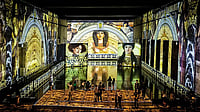Today, Shahrukh-six-pack-Khan is termed a phenomenon because of his two back-to-back hits. By that reckoning, what would you call Rajendra Kumar, aka Jubilee Kumar, today? All his films celebrated silver jubilees at the theatres, yet he was never the pre-eminent star in Bollywood. The stars' hold over the masses in those years was total and mesmeric. When Dev Anand flattened his Brylcreemed puff over his forehead and sported a side-parting, millions changed their hairstyle. Has any of today's Bollywood Khans been so fortunate as to enjoy comparable levels of hero worship?
Then why is it that the men who once had such immense, seemingly indelible, appeal have faded from public memory? In our poll on the all-time favourite male star, the legendary Dilip Kumar scores a meagre 8 per cent, followed by Raj Kapoor at 7, while Dev Anand, the original style-bhai, pants at a miserable 4. The explanation, quite simply, is that their fans too have faded away. One could argue that the films of yesteryears' Big Three are not completely out of circulation. We can still watch their movies on TV, and recent re-releases of classics like Mughal-e-Azam and Naya Daur have reaffirmed their box-office immortality.
The question is, do people now go to see Dilip Kumar or just the epic grandeur of Mughal-e-Azam? I think it's the latter, because Dilip Kumar as a star is too distant a figure in our memories to act as a force drawing us to his films.
The poor poll showing of the Big Three is due to their poor 'recall value'. On the other hand, Amitabh Bachchan scores a winning 32, despite the fact that Amitabh's last hit with him in the lead role was Khuda Gawah—and that was in 1992, a good generation separates it from this poll. Big B's landslide victory, I believe, owes much to his stupendous recall value.
After a brief spell of retirement, Bachchan relaunched himself in the late '90s in a series of films remarkable for their triteness. Dilip Kumar, too, in the '80s had tried to resurrect his career with films like Kranti, but the heartstrings did not thrum to the same magic. Raj Kapoor in his later years shunned the greasepaint, choosing instead to wield the director's baton. After Mera Naam Joker, he realised that Raj Kapoor as a leading man was no longer a saleable brand, so he cast and directed younger members of the Kapoor clan in his latter-day films under the RK banner to huge box-office hits. Dev Anand, in contrast, after the success of Hare Rama Hare Krishna, continued to cast himself as the leading man. Forever on the trail of that elusive, perfect heroine, he could cast himself as the army general, who is also the chief of police, as well as a selector of the Indian cricket team, and a business magnate to boot, who doubled up as an undercover supersleuth—all this rolled into one, monstrously multitasking character (Awwal Number, 1990). Unsurprisingly, all his later films flopped.
AB was far shrewder in relaunching himself. He realised early on that Inspector Vijay was hopelessly dated in the stylish 2000s. So he branched out into other mediums—modelling, live shows and, the clincher, Kaun Banega Crorepati Bachchan was lucky that his own reinvention in the late '90s coincided with the reinvention of Bollywood. The film industry moghuls realised that Bollywood now had to function in a more carefully planned, corporate style—to deliver a hit, it was no longer enough to sign up megastars, a multi-pronged strategy had to be planned. To promote the film, the producer engages the star in a blitz of public events, campaigns are launched both on TV and in print, so that even before you actually go watch the movie, the recall value of the star is high. And that is essential to the success of a film.
So, even if you have not seen an Amitabh starrer in a decade, you would still have seen him at least thrice a day—on TV, in newspapers and on billboards. The creation of Brand Bachchan, as cannily managed and promoted as a corporate entity, ensures that his recall value is unmatched by anyone else, past or present. Otherwise, the Big B, merely on the strength of his performances as a supporting star—which forms the bulk of his roles in the past decade—would surely not have bolted past other worthies to win the accolade of 'star of stars' in our opinion poll.
Shadows On A Stream
The test of time felled most stars. What matters is strategised recall value.

Shadows On A Stream
Shadows On A Stream
Y
eh bachchon ke khelne ki cheez nahin hai, haath kat jaye to khoon nikal aata hai
Waqt
Published At:
MOST POPULAR
WATCH
MORE FROM THE AUTHOR
×





















